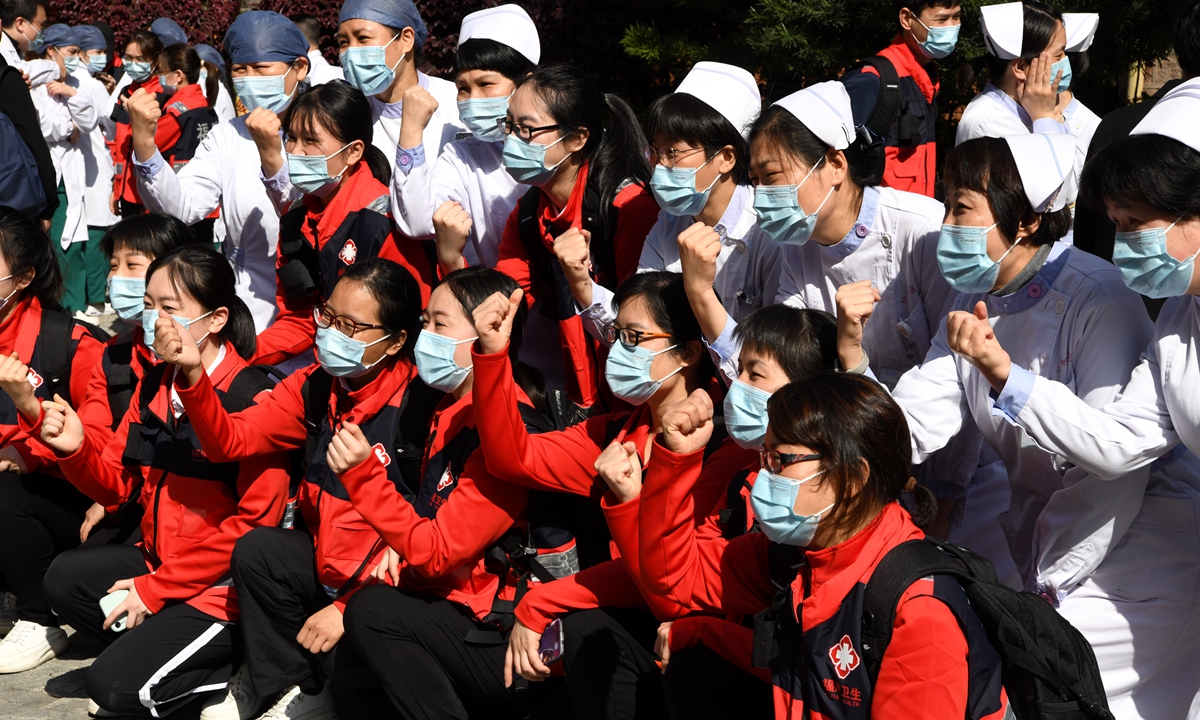
Members of a medical team from East China's Fujian Province take a photo on April 7, 2022 before departing to Shanghai to assist local COVID-19 prevention and control work. A total of 154 members joined this medical team. Photo: VCG
As Shanghai has entered a crucial stage to fight the Omicron outbreak, with cumulative local positive cases exceeding 100,000, city authorities on Thursday vowed to ensure daily supplies for 25 million residents and solve delivery problems during lockdown.
During an inspection in Shanghai from Wednesday to Thursday, Chinese Vice Premier Sun Chunlan encouraged people to further raise community volunteers' initiative, to help enhance delivery capacity as well as increase residents' confidence in the combat against the virus.
Vice Mayor Chen Tong said at Thursday's press briefing that Shanghai has sufficient reserves of supplies such as rice and meat, and additional food supplies could be transported from other regions when there's a need.
Supermarkets and vegetable farms can't operate normally and there has been reduced delivery capacity of e-commerce platforms due to epidemic prevention, leading challenges in distribution and deliveries, Chen said.
Shanghai has established special working groups to ensure daily supplies, with 10 emergency supply warehouses built, and the city has engaged with more than 100 vegetable production bases.
Despite the city's efforts to ensure residents' daily lives, rumors related to the epidemic still emerge quickly among the public.
The Shanghai Post Administration on Tuesday denied rumors claiming that the resurgence of COVID-19 in Shanghai started with virus-contaminated parcels. The administration said all parcels arriving in Shanghai shall be disinfected prior to delivery.
Gu Jun, a Shanghai-based sociology expert, told the Global Times on Thursday that it's good for the Shanghai authorities to respond to the public anxiety and provide more accessible channels for local residents to reflect problems, which can help dispel rumors.
In order to ensure people's normal lives, a "white list" of a group of markets, warehouses and delivery centers in the city that strictly follow COVID-19 preventive measures will be opened, the vice mayor said.
E-commerce platform Hema Fresh has launched an emergency channel in some stores to allow group purchasing, and a representative of the group could take the goods away themselves with a nucleic acid negative test within 48 hours and a health code, a Hema worker told the Global Times on Thursday.
Chen Guojiao, a vegetable supplier from Pudong New Area of the city, has been providing vegetables to communities since the beginning of this flare-up. He can provide 30,000 packages of vegetables with various combinations each day, with each set sold at about 100 yuan ($15.73).
"Orders from large residential communities can be as many as 600 at once," Chen told the Global Times on Thursday.
Farm product provider Chen Xian from Fengxian district can supply about 1,000 packages of vegetables and by-products to communities across the city. "Due to the limited logistics capacity, the amount of vegetables delivered is limited. We hope those elderly who can't use smartphones to order can get supplies through group-buying," Chen told the Global Times on Thursday.
Chen Tong, the vice mayor, said that delivery staffers in lockdown areas will be allowed to return to their workplaces to enhance delivery capacity following strict preventive measures. Several delivery staffers reached by the Global Times are under closed-loop management at home but they are eager to return to work and waiting for further notices from their companies.
Another E-commerce platform Meituan has deployed nearly 1,000 skilled sorting personnel from outside Shanghai to improve delivery capacity, Mao Fang, vice president of Meituan said at the press briefing. Meituan also dispatched batches of automatic delivery vehicles to ease the pressure of deliveries.
The financial hub on Wednesday registered a record number of 322 local confirmed cases and 19,660 asymptomatic infections. In order to detect and control risky groups in an early manner, Shanghai will continue a new round of city-wide nucleic acid tests or antigen tests on Thursday, and it vowed to speed up the process of collecting, sending, checking, reporting and verifying samples.
We have to speed up the process of tracking and epidemiological investigation of positive cases, "sparing no efforts to detect them all and transfer them in a rapid manner," Wu Qianyu, an official from Shanghai health authorities, said on Thursday's press briefing.
Over 38,000 medical workers from 15 provincial-level regions have been dispatched to Shanghai to aid the fight against the virus and the nucleic acid testing teams with a daily handling capacity of 2.38 million test tubes have also been dispatched, according to the National Health Commission.



